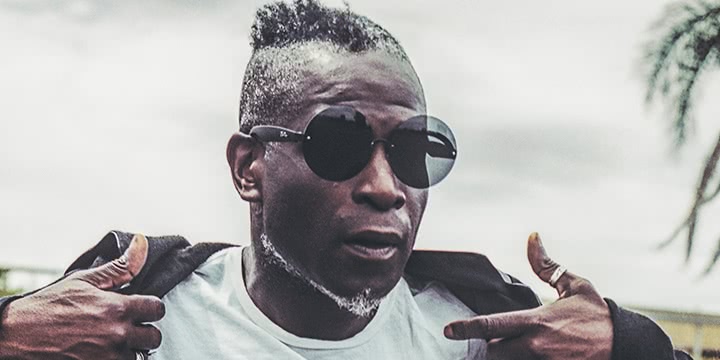When you or I come home from a big night on the town, we’re more likely to pass out on the couch with a greasy kebab in our hands than do anything that requires actual conscious thought.
But that’s exactly what separates Steve Spacek – AKA Beat Spacek, AKA Spacek, AKA Space Invadas (with Katalyst), AKA the man of many monikers – from the rest of us.
“I came back from somewhere and I was a bit worse for wear,” laughs Spacek, “but I had this idea in my head [for a song], so I was kind of like, ‘Well, I could go to bed, but then I would have forgotten it.’ So I was like, ‘Let’s just quickly lay it down.’ The left speaker on a Mac Pro, I used that as a mic, just to get a rough idea of it … and that ended up being it. I used the vocal. I used everything.”
And so was born ‘Alone In Da Sun’, the final track on Spacek’s soulful 2015 album Modern Streets. “In the end [the song]stayed cause I liked the vibe of it. If you listen to the vocal, you can hear I sound a bit stoned. And if you listen to the lyrics as well, that gives you the same idea.”
‘Alone In Da Sun’ is the outlier on Modern Streets: it’s the only song that Spacek didn’t record entirely with apps on his iPhone. He speaks fondly of the advantage modern technology gives musicians; the heads up it provides all those trying to create on the fly. “Sometimes I have the whole idea for a song in my head … I can hear all the elements straight away. That’s why the apps are really good, cause I can click on one and rush in and just put it down before it starts to change.”
That spontaneous, frenetic energy is ever-present throughout Modern Streets, reflected in both the record’s endearingly homemade touches – his children can be heard singing on one of the tracks – and the skittish drum work that holds the piece together. It’s an album about which Spacek speaks proudly.
“The music I make – sometimes you speak with artists and they sort of … deal with their music at arm’s length. I make the music I make because I love making it. And once it’s done, if I get to the point where I want to put it out, it’s because I really love it, you know?”
That said, Spacek does seem to regret that he has never properly had the opportunity to discuss the album and its themes. “I’ve never really explained it. Not on the packaging or anything. There’s no videos. It’s quite hard to put it across.”
But Spacek is quite happy to unpick the album now; eager, in fact, to set the record straight. The seeds for Modern Streets were sown decades ago, he says. “There was a time in the early ’80s where everything started to become a bit more eclectic. There was this club in [London’s] New Cross called The Flim Flam … It was the first time I had been out somewhere and there were punks, skinheads, soulboys, rastas, mods – they were all in there, in the same club, listening to their different music but all mixed in with each other.
“This album was kind of meant to be a modern-day representation of that. So you’ve got at least three main themes – you’ve got the soulful side of it, then you’ve got the kind of new wave romantic side, and then you’ve got the reggae side of it.”
It all adds up to a genuinely unique record. But although that original quality has introduced Spacek to a whole new legion of younger fans, it’s also seemingly dumbfounded mainstream critics, none of whom appeared really sure how to take Modern Streets. Not that Spacek minds, however. “I like that. I’m glad. I don’t like the idea of them sticking me into a hole. When I make my music, the whole idea is to change. If I’m going in one direction, then I want to go in the complete other direction. I want to go somewhere else.”
It’s certainly true that the one theme throughout Spacek’s career, from his work with the dearly departed J Dilla to his appearance on Katalyst’s seminal Australian hip hop album What’s Happening, has been an utter refusal to conform.
“It’s always going to be soulful in some way or the other, and there’s a good chance it’s going to be electronic, but not always. But other than that, those are the only things that can tie me down, you know what I mean? Sometimes it might be house, or it could be hip hop.”
It doesn’t seem like Spacek’s relentless energy is going to run out anytime soon, either. When asked if he has any projects on the horizon, he begins to excitedly list dozens. “There’s load of stuff – I’ve probably got quite a few albums’ worth of stuff that could be ready to go out. [At] some point I’ll probably do another Ninja [Tune] release, cause that album [Modern Streets] was the first album of a three-album deal.”
He takes a breath, then laughs. “Just so the message is clear, I just make music,” he says, simply. And then again:“I just make music all the time.”
[Beat Spacek photo by Mclean Stephenson]
Beat Spacek’s Modern Streets isout now through Ninja Tune/Inertia; and heplaysVibes On A Summer’s Day 2016, withJazzie B, Faze Action, Kylie Auldist, Russ Dewbury and more. it’s at Bondi Pavilion on Sunday January 24.

































